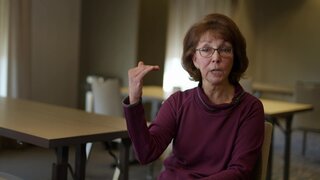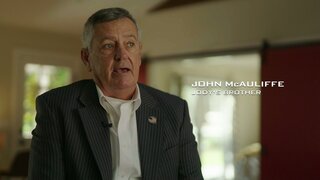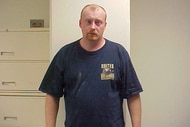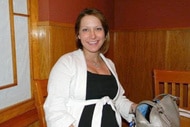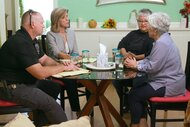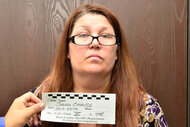A Man Insists His Wife Drunkenly Fell Off A New Jersey Cliff — Did He Actually Push Her To Her Death?
It took nearly two decades to prove that a New Jersey mom didn’t fall to a “brutal” death.
The Lover’s Chair, a cliffside ledge about 200 yards from a popular Palisades Park picnic lookout area in Bergen County, New Jersey, was known for its picturesque view and precarious setting. Nearby signs spelled out the danger. A protective fence was installed to keep people away. Still, people would go there — and on the night of September 20, 1992, the spot proved deadly for Jody Ann Scharf.
Her husband, Stephen Scharf, told police that he and Jody, 44, had been enjoying each other’s company, the view, and glasses of wine when she tumbled down the 120-foot cliff. He said that he yelled to his wife, who was intoxicated when she fell, but she didn’t respond.
The Englewood Cliffs Fire Department responded to the call, according to “Accident, Suicide or Murder,” airing Saturdays at 7/6c on Oxygen. Rescue workers rappelled down the cliff to search for Jody’s body, which wasn’t found directly below the Lover’s Chair. It was discovered 52 feet from the base of the cliff, and that raised a red flag for police.
Investigators said “it was evident” that Jody fell head-first. Between the 10-story fall and acceleration, “you have to expect the worst,” Lt. Walter Siri, a retired patrolman with the Palisades Interstate Police Department, told producers. “It’s brutal.”
Jody Scharf was pronounced dead at 11:40 p.m. and her body was taken to the medical examiner’s office.
Detectives questioned Stephen to uncover more about the couple, who lived with the 10-year-old son, Jonathan, in Hackettstown, New Jersey. Police learned that he was an engineer, she worked for AT&T, and, in what one investigator called a “bombshell” revelation, they had an open marriage. They also discovered Jody had recently filed for divorce.
Suspicious about Stephen's version of his wife’s fatal fall, police asked him to take a polygraph test. The results, Joseph Hornyak, a retired Detective Cap. with the Bergen County Prosecutor’s Office, told producers, indicated Stephen was being deceptive. “I felt he was lying,” Hornyak said.
Investigators looked to the autopsy results to shed light on what happened. Injuries were consistent with what was expected from a 10-story fall. Toxicology results showed that Jody’s blood-alcohol level was .12, which supported Stephen's claim that she’d been intoxicated when she fell.
In January 1993, the cause of Jody Scharf’s death was listed as “could not be determined.” The case went cold for a decade, until Bergen County prosecutors reopened the case.
Although Stephen maintained his wife passively fell to her death, investigators sought to show that she had been pushed. They had to build a case and disprove it was a romantic picnic-turned tragic accident. They dug deep into the Scharfs’ financial records, gathered testimony from family intimates, and scoured the scene where Jody’s body was found.
“In terms of physics those numbers don’t work,” Wayne Mello, trial prosecutor for Bergen County Prosecutor’s Office, told producers. “It simply could not have happened the way he said it did.”
A compelling lead turned up when they learned Stephen had a $300,000 life insurance policy on his wife. If she died accidentally, that payout would double. In 2003, when the paperwork could be processed, Stephen collected more than $770,000.
Investigators looked to people in Jody’s life to fill in the blanks about her life with her husband. Jody’s therapist told them Jody said she was afraid of Stephen, who was abusive. Close friends echoed that report. Jonathan Scharf, now an adult, testified that he was a witness to his father’s physical and mental torment of his mother.
In December 2008, 16 years after Jody died, Stephen Scharf, 57, who had remarried, was charged with murder. A month-long trial began in April 2011.
The prosecutor’s case was largely built upon what other people said Jody had told them — “state of mind” evidence, according to Mello. It allows someone else to testify to Jody’s statement. Expert witnesses for both sides spoke about Jody’s fall and where her body was found in relation to the base of the cliff.
Jonathan also testified against his father. Stephen's lawyers’ rebutted his testimony, noting that he was the contingent beneficiary of the $770,000 life insurance pay. He’d get the money if his father was found guilty.
On May 24, 2011, the jury began deliberation and returned with a verdict two and a half days later. Stephen Scharf was found guilty of pushing his wife off the cliff and was sentenced to life in prison.
Scharf continues to claim his innocence and has filed multiple appeals since.
To learn more about the case, watch “Accident, Suicide or Murder,” airing Saturdays at 7/6c on Oxygen, or stream episodes here.

